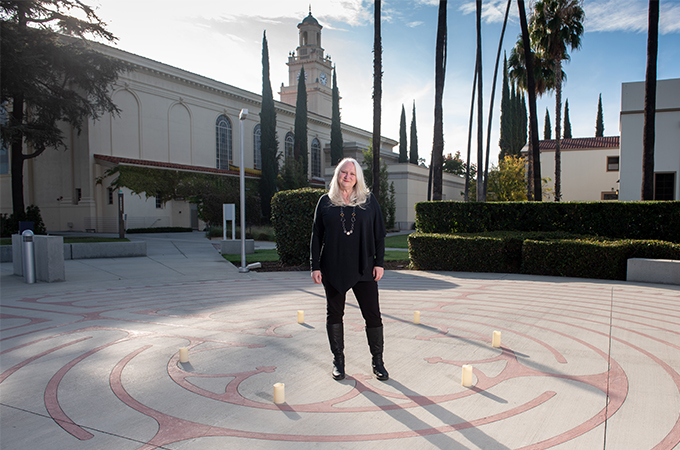For the past year and a half, we have lived in a state of what Graduate School of Theology Professor Marcia McFee categorizes as “chronic crisis” due to the COVID-19 pandemic. To address some of the effects of this prolonged state of stress, McFee is partnering with University of Redlands President Krista Newkirk and Provost Kathy Ogren to organize a week of remembrance and reflection to encourage University community members to come together to contemplate and process pandemic life.
“The pandemic and resulting uncertainties and losses have taken a toll on all of us,” Newkirk wrote in a recent memo. “We want to take this time to process our experiences from this time and listen with compassion to one another across all the constituents of this University community: students, faculty, staff, and trustees.”
During the week of November 1, the labyrinths on the Redlands and Marin campuses will be designated places for individuals or groups to visit in order to ponder and reflect. Writing materials will be available, and secure boxes will be positioned to collect ruminations from those who participate in person. It is also possible to submit thoughts digitally.
McFee, a scholar of ritual, says that humans have been engaging in reflective practices for millennia, but they took on renewed relevance during the pandemic. When feelings of trauma and grief are present for an extended period, especially when information is constantly changing and futures are uncertain, it becomes a state of being. However, humans weren’t meant to operate amidst continued and high levels of adrenaline. It isn’t sustainable—life becomes more difficult and tiring.
“I’ve been encouraging people to establish a rhythm of doing something every day at the same time,” she says. “This became especially important during lockdown when one day melted into the next. We need markers of time.”
Personally, McFee takes time each morning to light a candle, make coffee, and contemplate—a ritual she refers to as “CCC”—by writing one page in a journal. The repeated pattern has a greater meaning; it helps to center and ground her.
This process is similar to what participants will encounter during the week of reflection. McFee has compiled a list of possible questions that encourage introspection: What do you grieve? What was disappointing or disheartening? What is needed for moving forward?
These inquiries, McFee says, will help thoughts and feelings move through and out of the body and consciousness to engage with the disappointments and learnings participants accumulated during the pandemic, unknowingly or not. For those who are away from campus, taking a walk while considering these questions can be a helpful exercise.
Coming together to share stories and have communal experiences encourages the development of compassion and empathy, which McFee says are the core of action. “Personal journeys are affected by individual circumstances, so everyone’s is going to be different,” she says. “Becoming more empathetic is an incremental step towards making our community and the world a more just place.”
While stressors will continue to appear in our lives, McFee is grateful for a chance to gather safely in person. On Friday, November 5, she and other representatives from across the community will share with members of the University a variety of diverse perspectives that were collected during the week, accompanied by candlelight and music from the Chapel Singers ensemble outside under the large oak in the Quad.
“It will be a very intentional process of exploring different circumstances and hearing one another,” says McFee. “Not everyone has been affected the same way, and we’ll be newly enlightened.”
Visit the Week of Remembrance and Reflection webpage, learn more about the Graduate School of Theology, or explore available mental health resources for students and employees.






